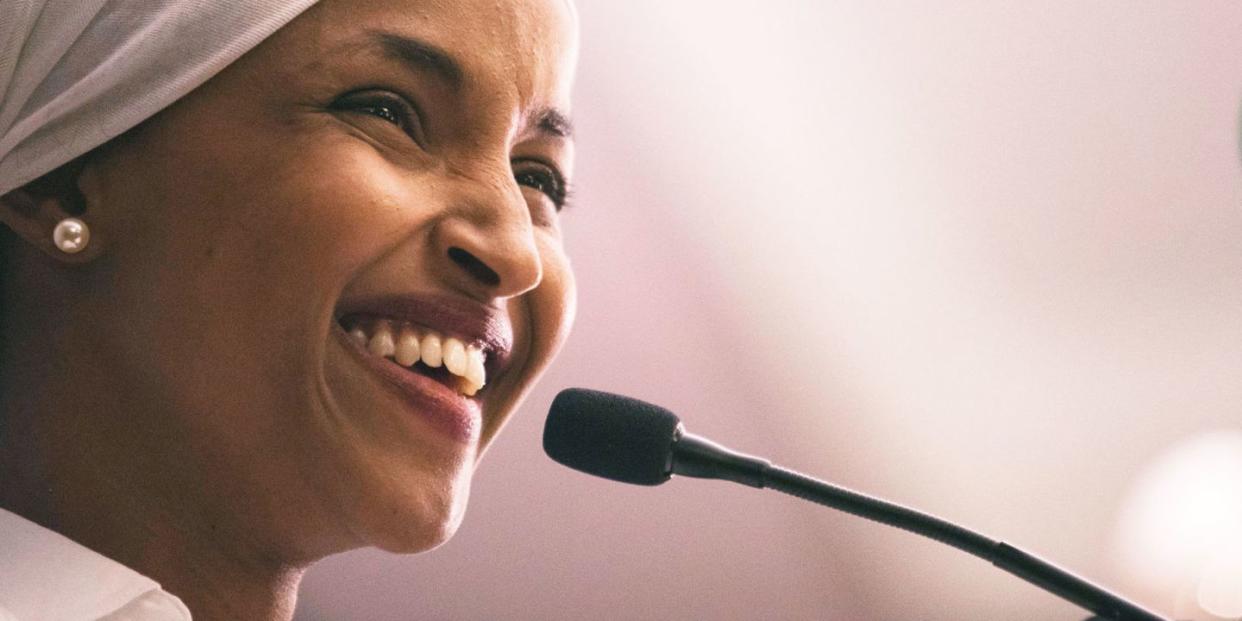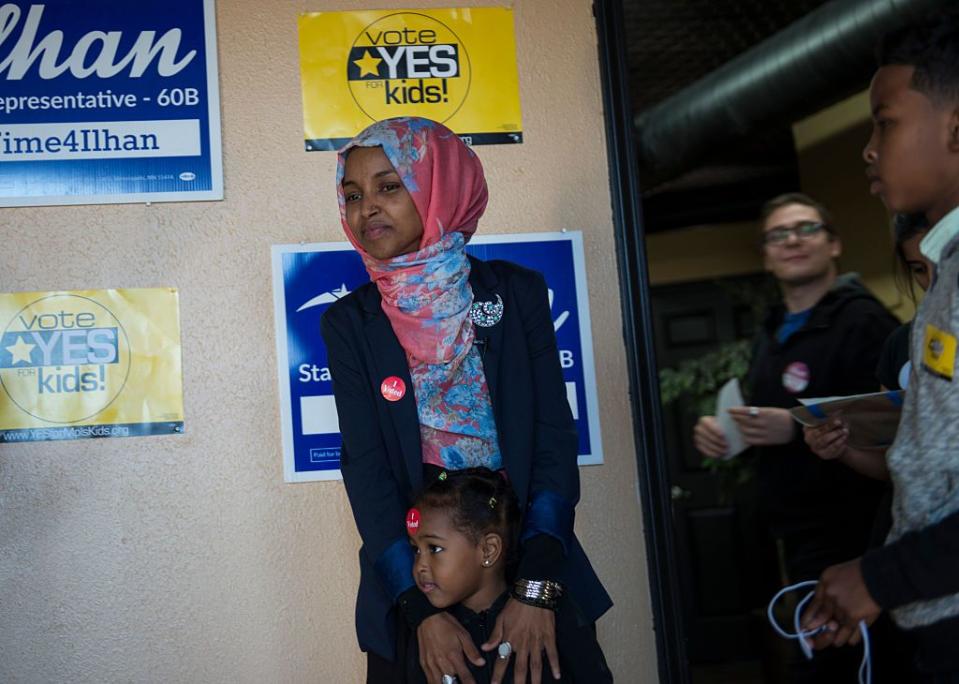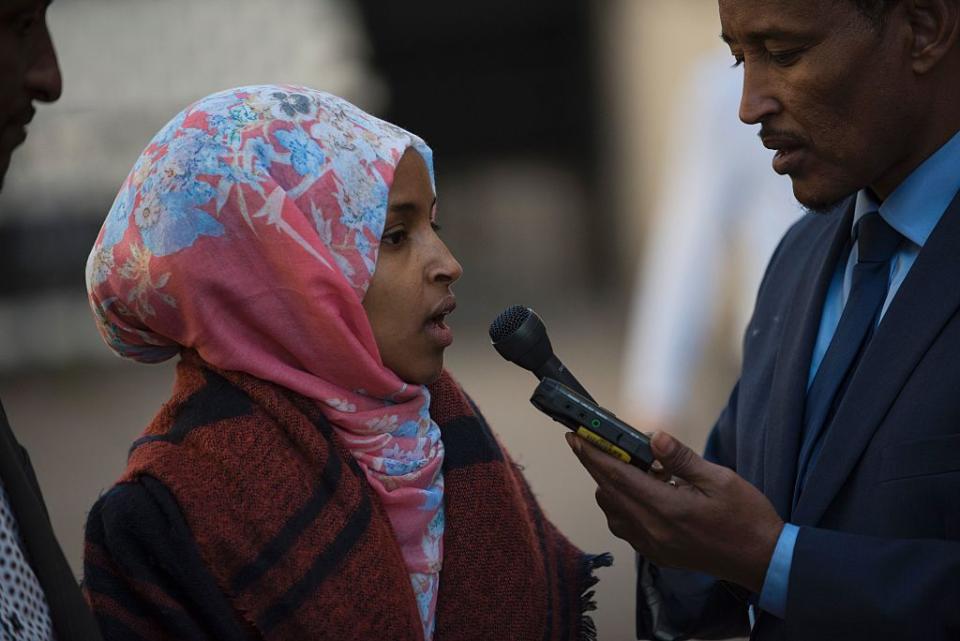The First Somali-American Lawmaker Fights for the America She Was Promised

After winning the Democratic primary in Minnesota's 5th Congressional District, Ilhan Omar is set to be the first Somali-American to ever serve in Congress. She could also become one of the first Muslim women in Congress, along with House nominee Rashida Tlaib. Back in March 2017, ELLE.com interviewed Omar about her path to politics and her decision to run for a seat in the Minnesota State Legislature:
Ilhan Omar's parents and grandparents raised her to believe that politics could create real change, despite the fact, she explains, that they lived "under colonialism and dictatorship and never had the chance to see it be used for good."
When her family moved from their native Somalia to the United States, after a stint in a refugee camp in Kenya, Omar, now 34, witnessed the power of politics in action. Omar was under 10, and, given her birthplace, exactly the kind of escapee that the Trump administration seems to want to keep out of the United States.
"I remember I took my grandfather to his first caucus," Omar says, remembering her first brush with democratic politics in America. "I was his translator, both culturally and linguistically. I just fell in love with politics and with what it could do."
This past fall, she got a more immediate lesson when she was elected the first Somali-American lawmaker in the country. On Election Day, the people in District 60B in Minneapolis, Minnesota, voted a proud, progressive Muslim woman into the Minnesota State Legislature. Her constituents chose an organizer, an activist, and a fresh perspective to represent them in Saint Paul over an incumbent-a woman, too, by the way-who'd held the position for over four decades.
Political prominence does not come without consequence, as Omar knows. After the election, she traveled to Washington, D.C. for policy training at the White House. During the visit, she took a cab and allegedly experienced "hateful, derogatory, islamophobic, sexist taunts and threats," according to an account she posted on Facebook, which was then picked up by news outlets around the country.
Back in Minneapolis, the discrimination has been more subtle. Omar feels it most when someone dismisses her opinions or expects her to be quiet because she's new. But slowly, she has found some common ground in the legislature, where she now often logs 12-hour days. "We can all agree that we need to be helping small businesses," Omar says, as an example. "All of us can agree that the cost of higher education is too high and college debt is too big of a burden for young people." There are places where she'll always disagree with people, but "we still have to get things worked out eventually," she says. "That's the deal. That's the job."
What are your earliest memories of America?
When we came to the United States, we had this extensive orientation. I remember it was this picturesque environment-people were happy, everybody had what they needed, shiny houses. And when we arrived, we were driving through Manhattan, and I remember seeing panhandlers and homeless people sleeping on the street and graffiti and trash everywhere. I remember turning to my father and saying, "This isn't the America you promised." And my father said, "Well, you just wait. We haven't gotten to our America yet."
At the time, I was in middle school, and it was really rough for me. I didn't speak English. I was dealing with being an extreme "other" for the first time. I'm Muslim and black and was coming from a Muslim-majority country where everyone was black. I had never had a conversation with my family about my identity. I remember the only words I knew were "hello" and "shut up." But when I'd come home and complain to my father that this wasn't what he promised me, he would tell me I had an opportunity to change my reality, that I needed to work harder to learn English, that I had to work harder to build relationships so that students could see me beyond my otherness. I needed to be better so that my environment would be better.
He and my grandfather both believed that this country has gotten better because people have believed they had a stake in it. They taught me that I had an obligation to act and to be part of that progress.

It sounds like your family, and the men in your life, especially, had a serious impact on you.
I grew up in a household where we all celebrated who we were. There was no space to make people feel different or "less than." There was no special treatment for the boys or the girls; we were all the same. My parents and grandparents felt that we all had the qualities we needed to be leaders. We didn't grow up in a household that believed in hierarchy or in asking for permission or in waiting your turn when it came to participation. Even when I was little, my father, my grandfather, my aunts and uncles, would ask me my opinions and encourage me to make choices. I got to choose what I wanted to eat, how I wanted to dress, if I wanted to stay in the particular classroom I was in, if I didn't like my teacher. No one ever said to me, "This is what we do." That was empowering, even when we were kids. We internalized that we had power.
You were an activist and an organizer for years before you decided to run for office. How did you make the choice to be a candidate?
I decided to run because I was one of many people I knew who really wanted to demonstrate what representative democracies are supposed to be. We wanted to show our commitment to true representation and reflective representation. And we had to think about the fact that in our own district, we were being represented by someone who'd been in office for 44 years, who was quite complacent, who really didn't see a need for grassroots action. I was encouraged to run by a good friend of mine, David Gilbert-Pederson, who ended up being my campaign chair.
What did he say that convinced you that now was the time for you to get into politics?
He kept saying that, as someone who's spent a good chunk of her life convincing others to run, I no longer had excuses for why I shouldn't be the one making that choice. [He understood] the obstacles that I saw-I'm a mother of three, I was working at City Hall for a city council member. And I knew that if I ran I would have to leave my job. I was thinking about what it means to run as a Muslim person, who is really unapologetically black and unapologetically Muslim. But David really believed that I had an important voice.

What surprised you about the campaign process?
The dismissal and treatment that we got from the incumbent. She would discredit everything, saying [our success] was because I was prettier and younger than her or that it was because of "white guilt" that people were supporting me. That was the most shocking and disheartening thing-to hear that from a feminist who has had a legacy of supporting woman candidates participate in misogynist rhetoric. As someone who sees herself as a beneficiary of the women who have come before me, it was sad to watch someone destroy her legacy and her good name in that way just to stay in power.
On the other hand, the outpouring of support and the chance we had to change the narrative about what it means for candidates of color to run for office, to be able to out-raise and out-organize their opponents in a district-that was very surprising in a positive way. To mobilize the number of people we were able to mobilize, to increase voter turnout by 37 percent-I hope it encourages people to believe more in candidates of color. We are not limited by the outdated conventional wisdom on how campaigns should be run and who should be a viable candidate for a political seat.

Obviously, there were some very personal attacks on you during your race, especially around your family and your marriage. Now that the election is over, how do you address that? (Editor's note: Several right-leaning conservative outlets accused Omar of having been married to her brother.Omar has deemed the allegations "absurd and offensive." She has long lived with the father of her three children and is married to him, she's said, "in my faith tradition." )
I have a great sense of who I am. I am very focused on creating positive change. And unless someone is a willing contributor to creating that positive change, their feedback or criticism, especially criticism that is about my personal life and the way that I live my life or the way that I dress or who I worship, has no actual bearing on the things that I take into consideration and the decisions that I make.
How much did your kids absorb? How much did they understand what you were facing?
My kids have been around politics since they were little. The two older ones understand what running for office actually means, and they grasp the importance of the work that I do. They've started to understand the demands on my time and even that the demands are different than those of a typical legislator because of what's happening nationally. Whenever you're the first, that comes with its own challenges and needs. I'm lucky in that they get that. I don't really have to deal with a lot of guilt for not being around.
Do you have a support system that helps make it all possible?
Yes! I have a wonderful partner. My husband is a gift from God in that he makes sure that I really know that [the kids] appreciate what I'm doing and that they understand why I'm gone. He really does a good job explaining to the kids what kind of future they will have as I continue to fight for it. And I have my extended family-my siblings, my friends, the community. I have so much positivity around me that the negative things really get drowned out. And it helps that I'm surrounded by women leaders who provide support and an ear when I want to vent.
Growing up under a government that wasn't a democracy, what do you make of our current political situation? What insight can you offer?
As I watch what is happening in this country and with this administration, I can't believe the lack of panic from every single citizen in this country. We have spent generations trying to advance democracy in all corners of the world, expressing our outrage over discrimination or bigotry or the lack of freedom of the press. Now we have a leader who is truly lessening our standing as a democracy by the minute. And the whole country isn't alarmed, outraged, trying to figure out how we get our country back to its actual ideals?
I intend to make sure that people realize that most of us who are here came here because we've already lived under terrible governments, the kind of governments that we are about to have. We understand defiance. And we know that if people don't act now, they're going to be living in one of the countries that they have been advocating against for years.
This interview has been condensed for concision and clarity.
('You Might Also Like',)

